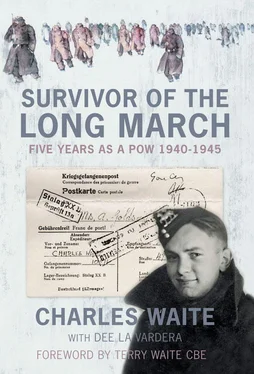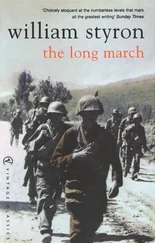As I got older I started helping out in the shop on Saturdays and in the school holidays. I didn’t mind doing that because I was saving up for a bike and I got five shillings pocket money. And when I was fourteen I left school to work there full time. I didn’t really have any choice about that.
The best days of your life, so they say, are your schooldays but not for me. I went up the road to Westbury Elementary School, a huge building which looked like a prison which, of course, it was to me. I was a nervous child, always afraid of the teachers, in particular Mr Milner. I can see him now, walking up and down the rows of desks with a cane in his hand, tapping it against his leg. If he asked you a question about something you had learned the day before and you had forgotten the answer, you got a rap on the knuckles. How did that help anybody remember anything? I’ve always hated bullies. Fortunately, when I moved up to the Juniors I had a different teacher who was more sympathetic and tried to encourage me.
I wasn’t good at anything except drawing, which I loved. I was proud when my teacher pinned up a picture of mine on the classroom wall. Miss Davies thought I was a good artist and could go further but my father couldn’t see the point of it. ‘You can’t make a living scribbling on bits of paper,’ he said and that was it. The only time my father took an interest in me was when he wanted to stop me from doing something.
If your family don’t understand you or don’t have time for you, it’s good to have somebody you can talk to. At school it was important to have friends; life was better if you had pals to play with and have a laugh. Friendship was a life saver during my years as a prisoner of war. I wouldn’t have survived my time in the labour camp or on the Long March home without my pals – Jimmy, Laurie, Sid and Heb. You need people to share things with, to look out for you, to say ‘Yes’ or ‘No, that’s not a good idea.’ There were a couple of occasions when they literally saved my life.
Ronnie was a school pal who lived in a little village down Barking Creek. There wasn’t much to do there so Ronnie used to hang around my place and we would go and play in Greatfields Park opposite my house or go down to the quayside and watch the tugs coming up the river and throw stones at seagulls. During term time, he passed my front door on the way to school and, however early I was, he was there waiting for me and we would walk on together.
For some reason he always brought me food – a bit like my POW pal, Jimmy who was a gamekeeper before the war and a dab hand at finding eggs or stray chickens to supplement our meagre rations in our camp. Whatever Ronnie brought for his lunch, whether cheese or paste sandwiches, even a slice of cherry cake, he had some for me too. I don’t know whether he had told his mother that I wasn’t fed properly at home, but I would happily eat whatever he gave me on the way to school or keep it for later.
Sometimes, I told Ronnie to go on ahead because I had an errand to do for my mother and he certainly wouldn’t have wanted to accompany me on that. I dreaded hearing the words: ‘Charlie, can you drop this off at Grandma’s on your way to school?’ Unfortunately, I passed the bottom of Harrow Road where my mother’s parents lived.
‘Oh, no!’ I said, ‘not me, please.’ I looked around for Win or Muriel but they had vanished. I hated going over there. I was afraid of Grandma Edwards who never had a good word for anybody, especially little boys.
Knock on the door, wait to hear the footsteps. Shuffle, shuffle. I knew it was Grandma because Grandpa was at the market. He was a farmer who had made his money during the First World War selling potatoes to the Army. Her first words were, ‘Your cap’s not on straight,’ or ‘Stop slouching.’ She was always finding fault. She never said anything nice or that she was pleased to see you. Mind you, after having had 21 children, 14 of whom survived, I expect she was worn out by it all and didn’t have any patience left for the likes of me.
I didn’t like people telling me off or telling me what to do, especially at school and I couldn’t wait to leave. I wasn’t a scholar anyway. I remember when my father got into trouble with the School Attendance Officer, or ‘Board Man’, who used to go round people’s houses checking on absent and truant school children. I had been off school for a while with influenza and had just had my fourteenth birthday in May. I was meant to go back to finish the term but I couldn’t see the point and refused to go.
‘All the other boys will laugh at me,’ I said. When I saw the Board Man coming down Movers Lane or when Muriel spotted him first through the shop window she would warn me, ‘Charlie, Charlie, Board Man’s coming!’ I would run out the back and into the long storage shed where we kept the stock. I would get right down in the straw behind the sacks of potatoes and wait for the all clear.
This happened on a number of occasions and, in the end, my father got into trouble because he couldn’t make me go to school. He had to appear before some of the Board people.
‘You have failed in your parental duty, Mr Waite, to ensure your son’s attendance at school. We have no choice but to impose a fine on you,’ they said.
He had to pay up and to his credit my father never punished me or hit me. Many fathers, and some mothers too, were pretty free with the backs of their hands or with a slipper. You only had to look at some of the poor mites in my class, with bruises on their arms and legs, to know what they had to put up with. I was lucky that my father wasn’t like that although he did believe in punishing his children. I remember Alfred telling me how dad had once punished Reginald for stealing.
Reg worked for a radio shop on the corner of Ilford Road and he rode a tricycle, like the ones used for selling Wall’s Ice Cream. He used to deliver accumulators – the rechargeable batteries used by people who didn’t have electricity. They were hired out to people for sixpence a week and Reg used to deliver them and collect the money. One day he decided he would not go back, ditched the bike and pocketed the money. The shop owner came round to our house in the evening asking after Reg but father didn’t know where he was. When Reg finally turned up, he told my father what had happened and admitted that he had spent all the money. My father was furious and immediately went and repaid the shop owner the missing money. Reg lost his job, of course, and had to spend a night locked in our shed.
So I was lucky and got away without any punishment for truanting. Not going back to school until my birthday was my way of rebelling against my father. You’re getting your way about me working in the shop, I thought, so I’ll get my way about not going back to school. That evened things out between us.
What I really wanted to be was a policeman like my father’s brother. I always had it in the back of my mind, hoping and praying that I would grow a bit more and a bit more every year. I knew that I wouldn’t get to the right height so it was always going to be joining my parents in the shop. Times were tough in the 1930s and everybody had to pull their weight and my father expected me to do the same. So I left school at fourteen with no qualifications and started working full time as an assistant greengrocer in the family business.
One thing I hated was being out front, dealing with members of the public. I was nervous serving customers and preferred being out of sight, working out the back cleaning up, unloading vegetables into the separate storage bins for potatoes, carrots, onions and so on. I unpacked the fruit boxes and arranged them on display out the front before we opened up. I tidied up, swept and cleaned the floors. I didn’t mind rolling up my sleeves and getting my hands dirty. For a short period we tried selling ready-weighed packs of vegetables which I bagged up in advance but people didn’t seem keen on them. They preferred asking for ‘a pound of potherbs’ which meant a selection of different vegetables picked out for the stew pot and put in their baskets.
Читать дальше




![Джеффри Арчер - The Short, the Long and the Tall [С иллюстрациями]](/books/388600/dzheffri-archer-the-short-the-long-and-the-tall-s-thumb.webp)







